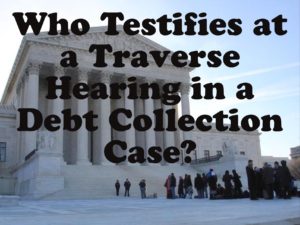By: Robert J. Nahoum

A traverse hearing is an in-court evidentiary hearing to determine whether a defendant was properly served with a summons and complaint. According to New York State law, before a court can render a judgment against you, it must first acquire PERSONAL JURISDICTION over you. Personal jurisdiction is obtained by properly serving the defendant with a summons and complaint;
The permissible means of service of process are:
- Personal Service – delivering a copy of the summons and complaint to you personally;
- Suitable Age and Discretion Service – delivering a copy of the summons and complaint to someone in your home of “suitable age and discretion†(someone competent enough to pass the papers on to you);
- Nail and Mail – After at least two failed attempts at personal or suitable age and discretion service, the process server may post a copy of the summons and complaint to the door and mail a copy to your last known address.
If service of process is challenged, the Court schedules a traverse hearing to determine whether service is proper. Â At a traverse hearing the burden is on the debt collector to call the process server as a witness and testify as to the service.
Pursuant to New York General Business Law Section 89-cc, a process server is required keep a log including the details of the service. The log must include:
“legible record of all service made by him as prescribed in this section. Such records shall be kept in chronological order in a bound, paginated volume. […]. The record to be maintained shall include the following information, where applicable: (a) the title of the action or a reasonable abbreviation thereof; (b) the name of the person served, if known; (c) the date and approximate time service was effected; (d) the address where service was effected; (e) the nature of the papers served; (f) the court in which the action has been commenced; (g) the index number of the action, if known; (h) if service is effectuated pursuant to subdivision four of section three hundred eight of the civil practice law and rules or subdivision one of section seven hundred thirty-five of the real property actions and proceedings law, a description of the color of the door to which the summons is affixed; (i) the process serving agency from whom the process served was received, if any; (j) type of service effected whether personal, substituted or conspicuous; (k) if service is effected pursuant to subdivision one, two or three of section three hundred eight of the civil practice law and rules, the record shall also include the description of the person served, including, but not limited to sex, color of skin, hair color, approximate age, height and weight and other identifying features; (l) if service is effected pursuant to subdivision four of section three hundred eight of the civil practice law and rules, the record shall also include the dates, addresses and time of attempted service pursuant to subdivision one, two or three of such section; (m) if the process server files an affidavit of service with the court, his record shall include the date of such filing.â€
At the traverse hearing the process server must have this log available and be able to testify about the details of the alleged service. In practice, especially with older cases, the process server cannot be found and if he or she is found, either can’t recall the details of the service or has failed to maintain his or her log.
The burden is on the debt collector to prove, through the process server’s testimony, that service of process was proper. If the debt collector cannot meet this burden and get the process server to testify convincingly about the purported service, the judge will likely dismiss the case.
If a traverse hearing has been ordered in your case, be prepared to go to court on the date of the traverse hearing to question the process server. Make sure that he or she has brought the log and question him or her about the details of the purported service.
If you need help settling or defending a debt collection law suit, filing for bankruptcy, stopping harassing debt collectors or suing a debt collector, contact us today to see what we can do for you. With office located in the Bronx, Brooklyn and Rockland County, the Law Offices of Robert J. Nahoum defends consumers in debt collection cases throughout the Tristate area including New Jersey.
The Law Offices of Robert J. Nahoum, P.C
(845) 232-0202
info@nahoumlaw.com
